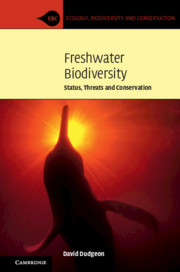Book contents
- Freshwater Biodiversity
- Ecology, Biodiversity and Conservation
- Freshwater Biodiversity
- Copyright page
- Epigraph
- Contents
- Foreword
- Permissions for Epigraphs
- 1 The Freshwater Commons
- 2 Global Endangerment of Freshwater Biodiversity
- 3 Overexploitation
- 4 Alien Species and Their Effects
- 5 River Regulation
- 6 Vanishing Lakes and Threats to Lacustrine Biodiversity
- 7 How Will Climate Change Affect Freshwater Biodiversity?
- 8 Ecosystem Services and Incentivizing Conservation of Freshwater Biodiversity
- 9 Conservation of Freshwater Biodiversity
- Afterword
- References
- Species Index
- General Index
- Plate Section (PDF Only)
7 - How Will Climate Change Affect Freshwater Biodiversity?
Published online by Cambridge University Press: 16 June 2020
- Freshwater Biodiversity
- Ecology, Biodiversity and Conservation
- Freshwater Biodiversity
- Copyright page
- Epigraph
- Contents
- Foreword
- Permissions for Epigraphs
- 1 The Freshwater Commons
- 2 Global Endangerment of Freshwater Biodiversity
- 3 Overexploitation
- 4 Alien Species and Their Effects
- 5 River Regulation
- 6 Vanishing Lakes and Threats to Lacustrine Biodiversity
- 7 How Will Climate Change Affect Freshwater Biodiversity?
- 8 Ecosystem Services and Incentivizing Conservation of Freshwater Biodiversity
- 9 Conservation of Freshwater Biodiversity
- Afterword
- References
- Species Index
- General Index
- Plate Section (PDF Only)
Summary
Flow regulation and water abstraction from rivers have devastating effects on receiving lakes. The most egregious example is the Aral ‘Sea’: from the 1960s, water for irrigation was diverted from influent rivers; 40 years later, the Aral had dwindled to tiny remnants - fisheries had long since collapsed.Shrinkage of lakes and wetlands across central Asia demonstrate the consequences of expanding irrigation, and highlight conflicts among human water users. Lake Chad in Africa has virtually disappeared as a result of water mismanagement, as has Lake Poopó in Bolivia; Yangtze floodplain lakes have diminished also. All such cases have had serious consequences for migratory waterbirds.In a few instances (Mono Lake in the US, the Mesopotamian marshes), the damage caused can be partially reversed by restoring water supplies, but the causes and drivers of ecosystem degradation are particular to each lake.Even the world’s largest water body, Lake Baikal, is subject to anthropogenic insult.Here, as is typical of lakes globally, a variety of factors – most often eutrophication, land-use change and alien species – contribute to habitat degradation and declines of endemic species.
- Type
- Chapter
- Information
- Freshwater BiodiversityStatus, Threats and Conservation, pp. 291 - 331Publisher: Cambridge University PressPrint publication year: 2020



